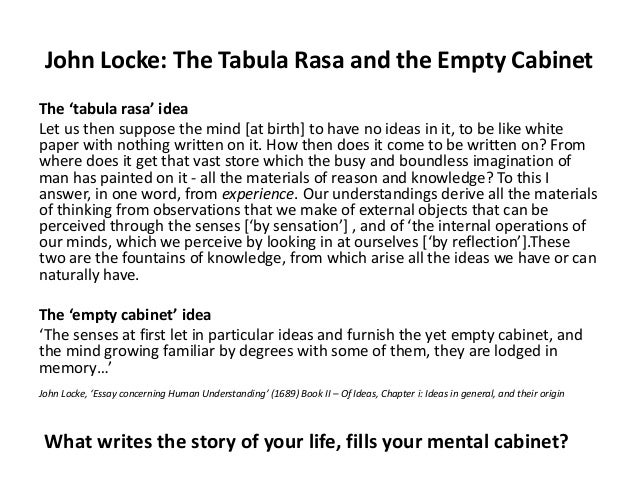
Tabula Rasa Meaning
Learn about the meaning of tabula rasa in psychology, which is the basis for behavioral therapy and related to treating phobias. In psychology, the term “blank slate,”.
Trending RN - April 08, 2020
- 1. Overunder
- 2. asl
- 3. sperg out
- 4. tmz
- 5. Benkinersophobia
- 6. banana clip
- 7. Cactus content
- 8. VBS
- 9. trump
- 10. Donald J. Trump
- 11. anuts
- 12. 🛒
- 13. Up the Bum
- 14. Blackfishing
- 15. lambe bicho
- 16. OneL
- 17. Playstation Thumb
- 18. Simped
- 19. Fopdoodle
- 20. fishting
- 21. pink moon
- 22. roll credits
- 23. no gas
- 24. coat hanger nipples
- 25. chikan
- 26. rock spider
- 27. Dropbox
- 28. Forf
- 29. bathroom break
- 30. Shopping Cart
:Tabula rasa (Latin: 'scraped tablet', though often translated 'blank slate') is the notion that individual human beings are born 'blank' (with no built-in mental content), and that their identity is defined entirely by events after birth.However, two uses of the term in modern usage are fundamentally incongruent.was the first to assert the tabula rasa theory in the 13th century, though it was who fully expressed the idea in the 17th century. In 's philosophy, tabula rasa was the theory that the (human) mind is at birth a 'blank slate' without rules for processing data, and that data is added and rules for processing are formed solely by one's experiences. Voip phone service free. The notion is central to Lockean. As understood by Locke, tabula rasa meant that the mind of the individual was born 'blank', and it also emphasized the individual's freedom to author his or her own. Each individual was free to define the content of his or her character - but his or her basic identity as a member of the human species cannot be so altered. It is from this presumption of a free, self-authored combined with an immutable human nature that the Lockean doctrine of 'natural' rights derives.Tabula rasa is also featured in.In recent times, however, tabula rasa has come to be understood fundamentally differently.
While the idea that the individual can be changed remains, the power to effect that change is now ascribed to society, not the self - and that power extends to the whole of human nature. Under this view, one can almost without restriction shape the individual by changing the individual's environment, and thus sensory experiences.ScienceIn computer science, tabula rasa refers to the development of autonomous agents which are provided with a mechanism to reason and plan toward their goal, but no 'built-in' knowledge-base of their environment.

They are thus truly a 'blank slate'.In reality agents are provided with an initial data-set or knowledge-base, but this should not be immutable or it will hamper autonomy and heuristic ability. Even if the data-set is empty, it can usually be argued that there is an in-built bias in the reasoning and planning mechanisms. Either intentionally or unintentionally placed there by the human designer, it thus negates the true spirit of tabula rasa.Generally people now recognise the fact that most of the brain is indeed preprogrammed and organised in order to process sensory input, motor control, emotions and natural responses. These preprogrammed parts of the brain then learn and refine their ability to perform their tasks. The only true clean slate in the brain is the. This part of the brain is involved in thought and decision making and is strongly linked with the.
The amygdala is involved in responses such as fight or flight and emotions and like other parts of the brain is largely 'pre-programmed', but has space to learn within its 'programming'. The amygdala is important in that it has a strong influence over the neo-cortex. There is much debate as to whether the amygdala prevents the neo-cortex from being defined as a clean slate.Controversially the amygdala is different from person to person. However, it only affects and not. Another controversial element is in the differing size of the neo-cortex.PoliticsGenerally speaking, one can never decide whether a theory is true or not simply by examining what political or philosophical implications it might have.
Nevertheless, some have been attracted to, or repulsed by, the notion of the 'blank slate' for such reasons.On the one hand, the theory of a 'blank slate' is attractive to some since it supposes that mental differences between normal human beings do not and cannot exist; therefore, and are profoundly illogical. However, this does not mean that such prejudice would make sense if there were innate differences.Some are also attracted to the idea of a 'blank slate' due to a fear of being determined, or even influenced, by their (though why being determined or influenced by society is better is a difficult question).On the other hand, the theory means there are no inherent limits to how society can shape human psychology; nor is there a political structure that best fits human nature. Battle run map. As such, the theory is taken up by many schemes that rely on changing human behaviour to achieve their goals, and many such schemes end up moving towards, or a reality. However, the opposing view, that humans have a genetically influenced nature, could also lead to controversial such as.See also. byThis page uses content from (.